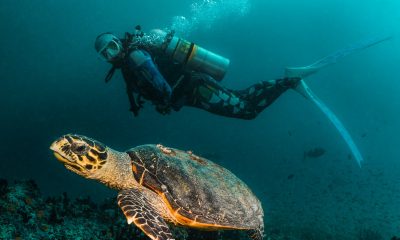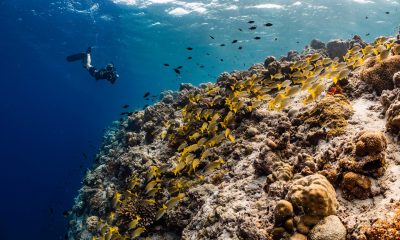Tips & Advice
Flying after scuba diving: Essential guidelines for safe travel

Scuba diving in the Maldives offers an unparalleled experience, with its vibrant coral reefs, diverse marine life, and crystal-clear waters. However, one crucial aspect that divers must consider is the timing of their flights after diving. Understanding the recommended waiting periods before flying is essential to ensure safety and prevent decompression sickness. Here’s what you need to know.
Understanding Decompression Sickness
Decompression sickness, also known as “the bends,” occurs when nitrogen bubbles form in the bloodstream and tissues due to rapid changes in pressure. This can happen if a diver ascends too quickly or flies too soon after diving. The reduced cabin pressure in an airplane can exacerbate the formation of these bubbles, leading to serious health risks.

Recommended Waiting Times
The waiting time before flying after scuba diving depends on the type and number of dives completed. Here are the general guidelines:
- Single Dive: If you have completed a single, no-decompression dive, it is recommended to wait at least 12 hours before flying. This allows sufficient time for the body to eliminate excess nitrogen.
- Multiple Dives or Multiple Days of Diving: For divers who have completed multiple dives or have been diving over several days, the recommended waiting period extends to 18 to 24 hours. This longer duration helps ensure that nitrogen levels in the body have decreased to safe levels.
- Dives Requiring Decompression Stops: If your dive profile included decompression stops, it is crucial to wait at least 24 to 48 hours before boarding a flight. Decompression dives involve higher nitrogen absorption, necessitating a longer off-gassing period.
Seaplane and Domestic Flights
Many tourists visiting resorts and other islands in the Maldives travel by seaplane or domestic flights. While these flights generally operate at lower altitudes compared to international flights, the same waiting time guidelines apply. The reason is that even at lower altitudes, the risk of decompression sickness remains significant due to the changes in pressure.
Practical Tips for Divers
- Plan Your Dives and Flights: When planning your diving trip, consider your flight schedule. Ensure that you have ample time between your last dive and your flight to adhere to the recommended waiting periods.
- Stay Hydrated: Proper hydration can aid in the elimination of nitrogen from the body. Drink plenty of water before and after your dives.
- Monitor Your Health: Pay attention to any symptoms of decompression sickness, such as joint pain, dizziness, or difficulty breathing. If you experience any of these symptoms, seek medical attention immediately.
- Use Dive Computers: Modern dive computers can help track your nitrogen levels and provide personalized recommendations for safe flying times based on your dive profile.
Flying after scuba diving requires careful consideration and adherence to safety guidelines to prevent decompression sickness. By following the recommended waiting times and taking necessary precautions, divers can enjoy their underwater adventures in the Maldives and travel safely. Always consult with dive professionals or medical experts if you have any concerns about your health and safety.
Culture
Palace for the prince: Muleeage’s century-long journey through history

It was ‘honeymoon season’ in Suez. Sultan Haji Imadudeen was reigning on a throne of love in Egypt. But back home, those were darker times, as Maldives continued to borrow from Bohra merchants of Mumbai. After all, the wedding expenses of the monarch had to be paid by the state.
Imadudeen has appointed his younger brother, Dhoshee Manippulhu of Maandhooge, as the regent to take care of the state’s affairs, but it was Prince Ibrahim Dhoshimeynakilegefaan of Athireege who ruled. Prince Ibrahim’s son, Abdul Majeed Didi of Athireege, took charge of stabilising the nation.
Backed by the British masters and business elites in Male’, Abdul Majeed Didi began hatching a secret plan. Finally, by the early hours of March 10, 1910, onlookers could understand that something was happening in Muleege. Beeru Mohamed Fulhu, who was at the Friday Mosque, saw the door being opened and Mohamed Shamsudeen being escorted out by his brother-in-law Abdul Majeed Didi and Sayyid Kilegefaanu, also known as Khatheeb Seedhi. The two men accompanied Shamshudeen to Boduganduvaru, the royal palace, and placed him on the throne as Sultan Shamsudeen Iskandhar, Al-Salitc. As Shamsudeen was the brother-in-law of both men, the aim behind the plan could mean more than just stabilising the nation; there might have been personal motives and interests.
After appointing Shamsudeen the sultan, Khatheeb Seedhi told him that no one was ever going to challenge his reign. He said that Shamshudeen was not going to leave the throne unless he wished to do so.
Khatheeb Sidi’s saying became true, as Shamsudeen remained in power for the next 31 years, six months and 28 days. That was until he left behind all the privileges of a king for the sake of his beloved son Hassan Izzuddeen, for whom he built Henveyru Ganduvaru or Muleeage from where he started his journey to become the sultan at one midnight. As the famous public speaker and poet Ibrahim Shihab later said, the sultan abdicated for the only son he ever had.
Muleeage, the presidential palace which is now 105 years old, was originally built for Shamsudeen’s son and the then Crown Prince Hassan Izzudeen. The palace was originally named as Henveyru Ganduvaru. It was a symbol of the king’s love for his son.
The origin of this address goes back to the era of the heroic Sultan Hassan Izzudeen, also known as Dhonbandaarain. This plot of land was first used to build a thatch hut when Muhammad Manik of Mulee shifted his family to the capital city. The house was later inherited by Dhonbandaarain and then by Ibrahim Noorahdeen and then by his son Shamsudeen. Hassan Izzudeen was born to Shamsudeen and Sithi Didi, daughter of Bodu Sidi of Kalhuhurage.
When Izzudeen was studying in Ceylon, Shamsudeen decided to build the house before his son returned home. Shamsudeen decided to build it as a palace for the crown prince.
Fully funded by state coffers, the project was commissioned in 1914. Ahmed Dhoshimeyna Kiligefaanu of Athireege was assigned as the project manager. Architects and builders were brought from Ceylon. Architecture and the design was that of the Victorian era with a touch of colonial architectural design. Furniture too was imported from Ceylon. Few transoms were designed by Easa Mohamed Fulhu from the island of Kela in Haa Alif Atoll.
The palace was opened on December 7, 1919, with a special Mauloodh, a cultural prayer.
Izzudeen came back from Ceylon after his education to live in the palace as “Henveyru Ganduvaru Manippulhu”. He lived with privileges that don’t match with that of any other prince. As he was a highly-skilled musician, the palace became a theatre for music. Izzudeen sang with his beautiful voice whilst also playing harmonium. Boys of his dance group, widely known as “Nashaa Party” danced to his music, dressed as ladies. Boduberu too was part of the fun at the palace. It was full on partying till midnight on most days. It is said that the novel, Dhonthuhkalaage Gellunu Furaavaru (lost teenage of Dhonthuhkala), written by Muhammad Ismail Didi of Meerubahuruge, was based on an incident that happened at the palace.
The elite of Athireege took all that as inappropriate for a crown prince. Their disapproval grew and Izzudeen was considered as someone who is ineligible for the throne. The first written constitution in the history of Maldives was passed as a result. It was written in that constitution that the sultanate will only go to a grandson of Dhonbandarain, effectively removing Izzudeen from the royal inheritance path.
But the constitution was later received by the people as a burden, as new laws were introduced to a population that was not aware of such rules. It made their life miserable.
“We can’t bear this anymore,” they said, as they gathered at the Gulhakulhey Fasgandu, an open area just next to the headquarters of the army, and tore apart the document. They even attempted to bring out some ministers to be dealt with by the mob.
The country then saw increased hostile actions against the government from Izzudeen who tried to take over.
Prime Minister Hassan Fareed issued orders to arrest Izzudeen’s allies. Izzudeen went to Bodubandeyrige, then headquarters of security forces, in person to try save his allies. Shamsudeen left the throne to follow.
The prime minister, who was paving way for the change in government, used this as an opportunity to overthrow Shamsudeen. The latter was banished to Fuvahmulah, in the far south, together with his son Izzudeen.
Izzudeen died on the island after a short ailment, whilst Shamsudeen was brought back to Male’ as his health deteriorated. He died shortly thereafter. Henveyru Ganduvaru was deserted after that.
All the palaces except that of the sultan were later downgraded and Henveyru Ganduvaru became Muleeage, taking the name of the first house built at the address.
Muleeage was used for several purposes for the next 80 years before becoming the presidential palace in 1953. From 1942 to 1947, it was used to house the ministries of home affairs and defence, and the office of the head of intelligence. It also served as the headquarters of the first newspaper in the country, Sarukaaruge Khabaru.
With the first republic that came into being in 1953, Muleeage became the presidential palace, serving as the official residence of Mohamed Ameen Didi, the first president.
As the monarchy was reinstated after overthrowing Ameen and abolishing the republic in a coup, Muleeage became the office of the prime minister. Ibrahim Famuladeyrikiligefaan and Ibrahim Nasir were prime ministers who used the office. At one point during their administrations, Muleeage also housed the ministry of defence.
Presidential palace and several ministries at some point, Muleeage has been in use ever since.
Apart from this, several high profile guests of the state stayed there during their visits. Late Queen Elizabeth and her late husband, The Duke of Edinburgh Prince Philips were amongst those.
Although Ibrahim Nasir, as the first president of the second republic, declared Muleeage as the presidential palace again in 1970, he didn’t use it as such. His successor, Maumoon Abdul Gayoom, was the first president to formally use it as his official residence. He stayed there from 1988 to 1994, before moving to Theemuge, a newly built presidential palace which later became the Supreme Court.
The first Supreme Court, which was the result of the present day constitution, was temporarily housed in Muleeage in 2008. Then came President Mohamed Nasheed who chose to make it the presidential palace yet again. It was also used as the offices of a national inquiry commission, which was setup to investigate the events surrounding Nasheed’s early departure in 2012, before becoming the presidential palace again.
In the century that has passed since Muleeage was built in its current design, it has witnessed numerous historical events in the country. It witnessed the declaration of the first republic and the reinstating of the monarchy. It hosted heads of states as well as ministers from different parts of the world. Indian Prime Minister Rajiv Gandi was one amongst them to be remembered.
Been a place for all that, the status of Muleeage is much more important in our history; it was the childhood home of Hassan Izzudeen, Dhonbandaarain, the heroic sultan who freed Maldives from the short-lived rule of the Malabari invaders, also known as “Holhin”. This was the place from where he came out for his battle with the flag of freedom flying over his head.
Tips & Advice
Protecting your Maldives vacation: How to avoid ticket and holiday scams during the holiday season

Maldives with its pristine beaches and crystal-clear waters, is a dream destination for many tourists seeking a tropical paradise. However, with the rise of cyber threats targeting travelers, it’s crucial for tourists to be vigilant and protect themselves from ticket scammers. Cybersecurity experts have warned that fake ticket and holiday package sellers are becoming more active during the holiday season, preying on unsuspecting travelers. Here we will look into the tactics scammers use and offers tips on how tourists can avoid falling victim to these scams.
The Ticket Scam Threat:
As the holiday season approaches, hackers capitalize on the increased demand for plane tickets and holiday packages. They use stolen or hacked credit card details to purchase plane tickets or holiday packages and then offer these tickets at seemingly irresistible prices through phishing websites that may appear legitimate. Adrianus Warmenhoven, a cybersecurity expert at NordVPN, emphasizes that scammers take advantage of individuals who let their guard down due to the perceived high cost of secure options.
The Consequences of Falling Victim:
Once a traveler falls for the scam and purchases a fake ticket or holiday package, they receive a booking confirmation and often remain unaware of the deception until the day of travel. At this point, they may discover that their booking has been canceled by the real ticket owner or the credit card company, leaving them stranded at the airport with no recourse for a return flight.
Protecting Yourself from Ticket Scams:
Adrianus Warmenhoven provides valuable tips for tourists to protect themselves from ticket scams and ensure a secure and stress-free holiday in the Maldives:
- Beware of Too-Good-To-Be-True Prices:
- If a ticket price seems too good to be true, it probably is. Scammers lure victims with unrealistically low prices obtained by stealing money from other people.
- Exercise Caution with Last-Minute Deals:
- Hackers aim to sell tickets quickly before the legitimate cardholder cancels the transaction. Be skeptical of last-minute deals and thoroughly verify their authenticity.
- Identify Phishing Websites:
- Scrutinize websites for grammar mistakes, flashy ads, or poor design. Hackers often cut corners on these details. Consider using cybersecurity tools like NordVPN’s Threat Protection to help identify phishing websites.
- Buy from Trusted Distributors:
- Whether purchasing tickets directly from an airline or through a distributor, choose well-known platforms with positive user reviews. Avoid unfamiliar or dubious sellers to minimize the risk of falling victim to scams.
- Contact Service Providers for Verification:
- If you suspect you may have purchased a fake ticket, promptly contact the service provider using the email or phone number listed on their official website. Verify the legitimacy of your booking to avoid any travel disruptions.
As you plan your dream vacation to the Maldives, staying vigilant against ticket scams is crucial. By following these tips and being cautious online, tourists can protect themselves from falling victim to scammers and ensure a safe and enjoyable holiday experience in this tropical paradise. Remember, a little extra caution can go a long way in safeguarding your vacation memories.
Featured
Benefits of hiring a revenue management company in the hospitality industry

In the fiercely competitive hospitality industry, maximizing revenue and optimizing profitability are paramount for long-term success. With ever-evolving market dynamics and changing consumer behavior, effective revenue management has become a complex task. To navigate this landscape successfully, many hospitality businesses are turning to revenue management companies for their expertise. In this article, we will explore the benefits of hiring a revenue management company specifically tailored to the hospitality industry and how it can drive growth and profitability for your business.
1. Strategic Pricing and Revenue Optimization
One of the primary advantages of partnering with a revenue management company in the hospitality industry is their ability to optimize pricing strategies. These companies have a deep understanding of market dynamics, consumer preferences, and competitive forces. Leveraging advanced analytics and tools, they can analyze historical data, market trends, and demand patterns to identify optimal pricing opportunities. By implementing dynamic pricing models, they ensure that your hotel or resort is charging the right prices at the right time, maximizing revenue and profitability.
2. Improved Demand Forecasting and Inventory Management
Accurate demand forecasting and effective inventory management are crucial for the success of any hospitality business. Revenue management companies specialize in analyzing historical data, market trends, and external factors to accurately forecast demand. This allows them to make informed decisions about room rates, promotions, and availability. By optimizing inventory allocation and pricing strategies based on demand fluctuations, they can minimize revenue loss from underselling or overbooking, ensuring maximum occupancy and revenue generation.
3. Increased Operational Efficiency
Running a successful hotel or resort involves managing multiple operational aspects, including revenue management. By outsourcing this critical function to a revenue management company, you can free up your internal resources and focus on core operations. These companies have dedicated teams of revenue management professionals who continually monitor and adjust pricing and inventory strategies based on market conditions. Their expertise and automation tools can streamline processes, reduce manual errors, and improve overall operational efficiency.
4. Access to Advanced Technology and Expertise
Revenue management companies in the hospitality industry leverage cutting-edge technology and tools specifically designed for revenue optimization. By partnering with them, you gain access to these advanced systems without the need for significant upfront investment. These tools enable comprehensive data analysis, price optimization, and real-time reporting. Additionally, revenue management companies have a team of experienced professionals who are well-versed in industry best practices. Their knowledge and expertise can be invaluable in making data-driven decisions and implementing effective revenue strategies.
5. Competitive Advantage and Adaptability
In a competitive market, staying ahead of the competition is crucial. Revenue management companies can provide you with a competitive edge by constantly monitoring the market, identifying emerging trends, and adapting pricing and revenue strategies accordingly. Their ability to react swiftly to changes in demand, competition, and market conditions allows your business to stay nimble and responsive. By keeping a finger on the pulse of the industry, revenue management companies can help you anticipate challenges and seize opportunities, ultimately increasing your market share and revenue.
6. Cost-Effective Solution
While it may seem counterintuitive, hiring a revenue management company can actually be a cost-effective solution for your hospitality business. These companies operate on a performance-based model, where their compensation is often tied to the revenue growth they generate. This aligns their incentives with your business objectives and ensures that you get a solid return on investment. Moreover, by optimizing revenue streams, avoiding revenue leakage, and minimizing operational inefficiencies, they help improve your bottom line, offsetting the cost of their services.
In today’s fiercely competitive hospitality industry, revenue management plays a crucial role in driving growth and profitability. By partnering with a revenue management company, you can harness their expertise, technology, and industry knowledge to optimize pricing strategies, improve demand forecasting, and increase operational efficiency.
Editors Note: The article above is based on a publication by OARS Consultancy, a hospitality consultancy firm located in Dubai. OARS, which stands for OCCUPANCY.ADR.REVPAR.SOLUTION, is dedicated to the hospitality sector with a strong emphasis on revenue management consultation and hotel and resort-related projects. The company comprises a team of professionals from around the world who bring their expertise together with the common goal of providing solutions to optimize revenue growth for hotels and resorts. For more information about OARS visit https://oarsolution.com/
Link to the original publication.
-
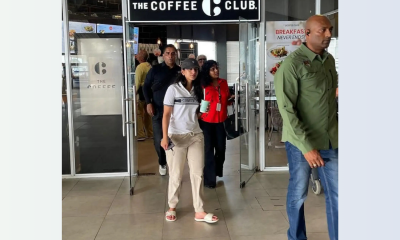
 News1 week ago
News1 week agoAmbani family members holiday in Maldives again
-
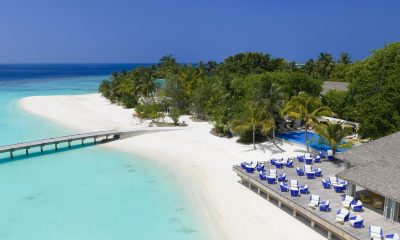
 Featured1 week ago
Featured1 week agoPulse Hotels & Resorts unveils eco-chic Eri Maldives in North Malé Atoll
-
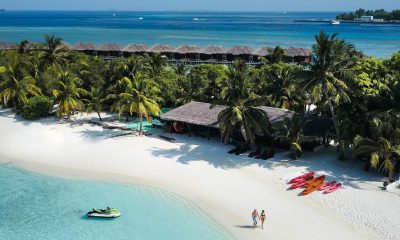
 Featured1 week ago
Featured1 week agoEndless Summer awaits at Sheraton Maldives Full Moon Resort & Spa
-
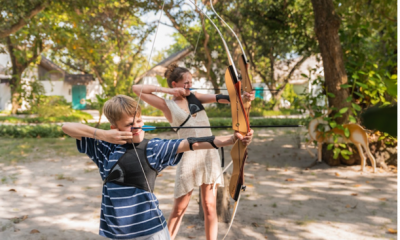
 Featured1 week ago
Featured1 week agoFrom Lunar New Year to Easter: Sirru Fen Fushi reveals seasonal line-up
-
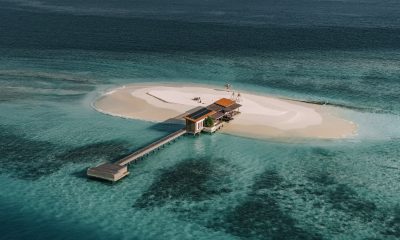
 Cooking1 week ago
Cooking1 week agoAlila Kothaifaru Maldives hosts Campania Wine Dinner with Mastroberardino
-
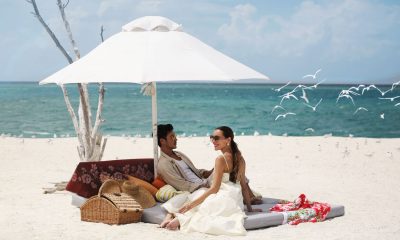
 Featured1 week ago
Featured1 week agoThe Standard, Maldives unveils romantic Valentine’s Day experiences
-

 News1 week ago
News1 week agoMaldives named among world’s top destinations in Tripadvisor’s 2026 awards
-
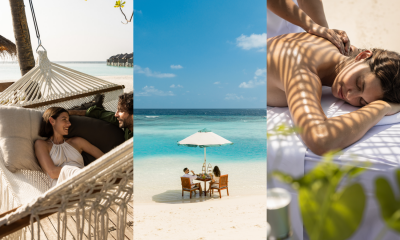
 Featured5 days ago
Featured5 days agoRomantic island experiences await couples at Sun Siyam Vilu Reef



